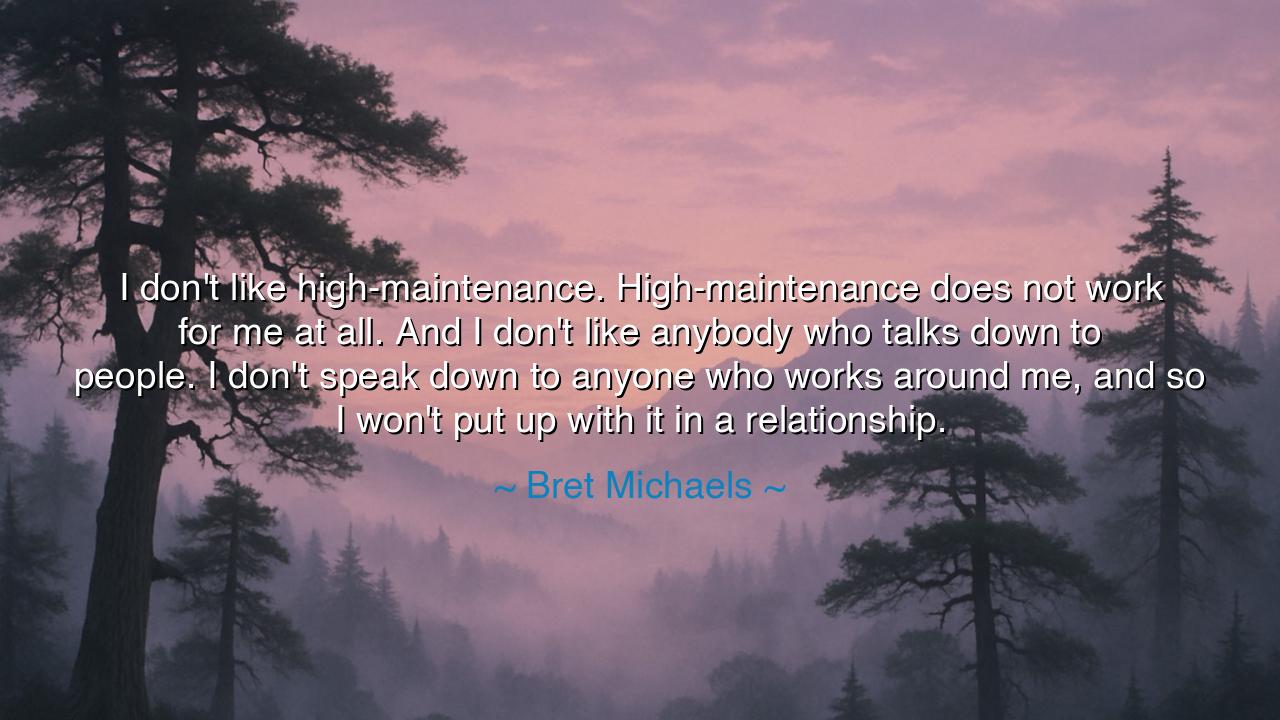
I don't like high-maintenance. High-maintenance does not work
I don't like high-maintenance. High-maintenance does not work for me at all. And I don't like anybody who talks down to people. I don't speak down to anyone who works around me, and so I won't put up with it in a relationship.






Hear, O children of wisdom, the words of Bret Michaels, who speaks with the fire of one who values simplicity and respect: “I don’t like high-maintenance. High-maintenance does not work for me at all. And I don’t like anybody who talks down to people. I don’t speak down to anyone who works around me, and so I won’t put up with it in a relationship.” In this declaration is revealed the path of humility, equality, and honor in the bonds of human fellowship.
He warns against the burden of the high-maintenance spirit, which demands endlessly and gives little in return. Such a way of being is not a partnership, but a chain that binds one soul in constant strain. True relationships are not built upon vanity or excess, but upon shared labor and gentle care. To reject the high-maintenance path is to seek balance, harmony, and the peace of mutual respect.
And he speaks also of those who talk down to others, who raise themselves by belittling those around them. This, he declares, is poison to the heart, for pride that scorns others cannot dwell alongside love. The man who would honor his companions must first honor all souls, whether servant or friend, worker or kin. Thus he sets his measure: to treat others with dignity, and to expect no less within the circle of intimacy.
From this arises a broader teaching: that the worth of a union lies not in wealth, beauty, or glamour, but in respect. The one who honors others creates harmony, and the one who scorns destroys it. Bret Michaels, though born of a modern age, speaks with the wisdom of the ancients—that without humility and equality, no bond can endure.
Therefore, let all who seek love remember: avoid the vanity of high-maintenance, flee from the poison of condescension, and choose instead the path of mutual honor. In this way shall your bond be strong, your labor light, and your heart at rest. Would you like me to refine this further into a parable-like teaching, where the proud and the humble are set as contrasting figures for the lesson?






UGUser Google
This quote from Bret Michaels resonates with me because it touches on two important aspects—self-respect and equality. High-maintenance in a relationship often carries a negative connotation, but is there room for compromise? Maybe it’s not about eliminating expectations, but finding balance and understanding. How do we ensure that both parties’ needs are met without feeling burdened by the other's desires? Can we find middle ground without labeling someone as 'high-maintenance'?
HVhuy vo
Bret Michaels’ view on relationships makes me think about how societal expectations shape our perceptions of what’s 'high-maintenance.' The idea of someone 'talking down' to others is something I agree with, but is there a potential that some people mistake simple needs or desires for being high-maintenance? How much should a person’s expectations be seen as part of who they are, rather than something that could be labeled as 'too much'?
NMBun Nhun Nuoc Mam
I think this quote reflects the idea of authenticity and mutual respect in a relationship. If both parties are equal and there’s no talking down to each other, it seems like a foundation for something healthy. But I also wonder, what if one person in the relationship feels their partner isn’t providing enough emotional or physical support? Does this make the partner 'high-maintenance' or just someone who needs more? How do we distinguish between genuine needs and expectations that can be unreasonable?
DTThanh Dat Tran
Bret Michaels’ stance on high-maintenance behavior seems to emphasize fairness, which is crucial. But I wonder, is there a fine line between being 'low-maintenance' and compromising too much? Sometimes, a person’s desires and expectations may not be 'high-maintenance' but just part of their personality. Is it possible to meet those needs without feeling overwhelmed, or does it require open communication and setting healthy boundaries in the relationship?
S8Le Phan anh Son 8.9
I can totally relate to this quote. It’s great that Bret Michaels values respect and honesty in a relationship. No one wants to feel belittled or like they're constantly walking on eggshells. But how do we navigate relationships where one person has more emotional or practical needs than the other? Can these differences be balanced without one person feeling like they're too 'high-maintenance' or unappreciated?